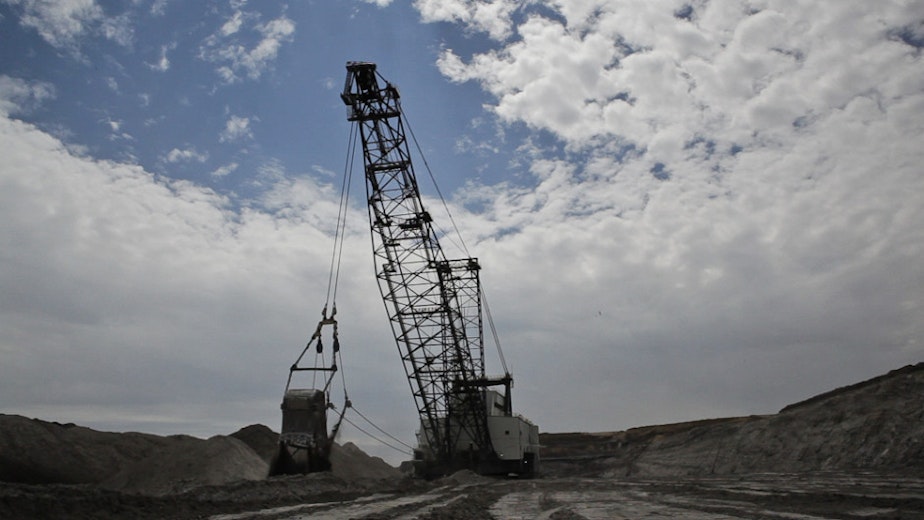Army Corps denies permit for Puget Sound coal export terminal

The Lummi Nation’s Tribal Chairman Timothy Ballew pulled fellow council member Travis Brockie into his office to announce the big news:
He’d just gotten off the phone with Col. John Buck of the Army Corps of Engineers.
After four years of back and forth between the tribe and its adversaries, the Corps had decided not to permit a coal-shipping terminal on the north shore of Puget Sound; such a development would have done unacceptable harm to the Lummi’s ability to fish those waters as their treaty with the U.S. government calls for.
Top read: Yes, I live in the Jungle. And so do 400 other people
“The Army Corps has denied the permit for Gateway Pacific Terminal,” Ballew said, a smile slowly spreading across his face.”
Sponsored
The two tribal leaders hugged.
“I’m at a loss for words,” Brockie said.
The agency’s decision, announced Monday, comes in response to a request by the Lummi Nation to reject the project known as the Gateway Pacific Terminal. It would have been the largest such facility in the U.S., sending coal from the Rocky Mountain region to markets in Asia.
Lummi Nation tribal leader explains his people’s opposition to the Gateway Pacific coal terminal:
Sponsored
The decision follows the same rationale employed two years ago by the state of Oregon when it rejected a permit for construction of a coal-shipping project along the Columbia River. Columbia Basin tribes said their treaty-protected fishing rights would have been harmed. Monday’s decision is the first time a federal agency has denied permits for this reason to a Northwest energy project.
“I have thoroughly reviewed thousands of pages of submittals from the Lummi Nation and Pacific International Holdings,” said Buck, the Corps’ Seattle District commander, in a statement. “I have also reviewed my staff’s determination that the Gateway Pacific Terminal would have a greater than de minimis impact on the Lummi Nation’s [treaty fishing] rights, and I have determined the project is not permittable as currently proposed.”
The denial is a major blow to project developer Pacific International Terminals, a subsidiary of Seattle-based SSA Marine. The company had proposed to build a $700 million terminal that would export up to 54 million tons of coal a year from Montana and Wyoming to Asia. At that size, it would have been the largest coal export terminal in North America.
That would have meant that on a daily basis, nine one-mile-long trains loaded with coal would have traveled through the Columbia River Gorge, through the Portland-Vancouver and Seattle-Tacoma metro areas, and on to their final destination at Cherry Point, north of Bellingham, Washington.
Tim Ballew II, chairman of the Lummi Indian Business Council called the Corps’ permit denial “a historic victory.”
Sponsored
READ: Coal Scorecard — Your Guide to Coal in the Northwest
“We are pleased to see that the Corps has honored the treaty and the constitution by providing a decision that recognizes the terminal’s impacts on our fishing rights,” he said in a statement. “This decision is a win for the treaty and protects our sacred site. The impact of a coal terminal on our treaty fishing rights would be severe, irreparable and impossible to mitigate.”
At a press conference following the announcement, Buck said the Corps’ finding effectively kills the Gateway Pacific Terminal project. The agency has ended its review of the company’s permit application.
However, he said, the company could challenge the Corps’ determination, significantly change the proposal so it wouldn’t interfere with treaty fishing rights, or convince the Lummi to withdraw their objections to the project. Any of those situations could lead the Corps to reinitiate the review process, Buck said.
The agency found the project’s trestle and associated wharf would impact 144 acres over the water, and that would interfere with the tribe’s ability to access fish in their usual and accustomed fishing areas.
Sponsored
Buck said the determination on the terminal doesn’t necessarily mean that other projects in the area would receive the same determination. Each proposal has to be evaluated independently, he said.
The Corps and Washington Department of Ecology were in the midst ofreviewing the environmental impacts of the project.
Last month, SSA Marine asked state regulators to suspend their environmental review of the project until they ruled on the Lummi request.
The Gateway Pacific Terminal was projected to generate millions in property taxes and create hundreds of jobs. But it has faced fierce opposition from Native American tribes and environmental groups concerned about increases in train and vessel traffic, coal dust and climate change.
Supporters of the project with the NW Alliance for Jobs and Exports released a statement saying the Corps’ decision to deny the permit before completing its environmental review process is “truly disturbing” and “sends a dangerous signal that the Army Corps values special interests over the rule of law.”
Sponsored
“This ruling could have a chilling impact on thousands of families in northwest Washington who were counting on this project to provide good-paying jobs,” said Kathryn Stenger, spokeswoman for the group.
The Gateway Pacific project is one of six coal export terminals proposed since 2011 in the Northwest. Since then, all but one have been put on hold or abandoned. Monday’s decision by the Corps leaves only the Longview, Washington, coal terminal still in play.
Export terminals have been seen by advocates as lifelines to the struggling U.S. coal industry, which is facing a barrage of new federal restrictions on coal-fired power plants and competition from cheap natural gas.
Several major coal companies, including Peabody Energy and Arch Coal, have declared bankruptcy this year.
